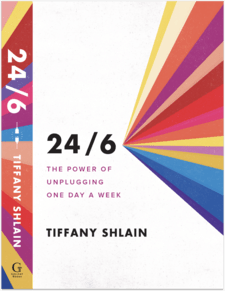Tech Shabbat: Seeing the Light
While I love many aspects of Jewish culture—wrestling with ideas, the food, the humor—as a feminist, the patriarchal nature of Judaism has always been problematic for me. The traditional stories and liturgy mostly feature male heroes. Reciting and retelling biblical tales of male strength and adulation feels like propagating the same old power dynamics. How can we make our culture more equal if we keep reinforcing the boundaries around what roles women play… and don’t play?
Still, there are sparks of equality. The one time I feel women share equal footing with men (if not the spotlight) is Shabbat. Shabbat is full of rituals that honor women and feminine perspective and roles. We call Shabbat a “bride,” and women bring in Shabbat by saying the blessing over candles.
In the home I share with my husband and daughters (aged sixteen and ten), the lighting of the candles also signifies the moment we turn off all screens in the house for 24 hours, a period of time that my family calls “Technology Shabbat.” This practice, which we’ve been doing weekly for the past ten years, has improved our lives in nearly every way, and the benefits last all week long. We feel more relaxed and connected. We’re more creative and productive. And when we do use screens on the other six days, our Tech Shabbat reminds us to use technology more intentionally. Having this very clear boundary from screens for Shabbat helps us create our favorite day of the week.
Historically, boundaries have held women back. But this is a boundary that empowers, putting us in control of our time and connecting us to our true selves and the things that really matter. So as we do every week, this Shabbat, we’ll power down our screens, and I’ll light the candles, joining Jewish women all around the world, creating some brightness and insight in the dark.
Here eight insights I have gleaned from my decade of practicing Tech Shabbats. (In my new book 24/6: The Power of Unplugging One Day a Week, I explore these in more detail):
1. Taking time off screens helps you sleep better. The sleep I get on Tech Shabbat is the best sleep I get all week. There’s a good reason for this: The blue light from screens interferes with the brain’s winding-down process. On Tech Shabbat, I can fall asleep naturally. The rest of the week, I stay off screens for an hour or so before bedtime, to give my brain a break from blue light.
2. It will make you happier. Being on screens all the time has made us unhappier. A study by Holly B. Shakya and Nicholas A. Christakis found “both liking others’ content and clicking links significantly predicted a subsequent reduction in self-reported physical health, mental health, and life satisfaction.” Adolescents seem to be especially at risk: The rate of teen suicide attempts has doubled since smartphones were released, and research suggests social media may be a factor.
3. It will increase Shalom bayit. Shalom bayit—a peaceful home—is an important Jewish principle. Going screen-free weekly has increased the peace in our home by giving us the opportunity to really connect with each other.
4. It's healthier. All that time on screens isn’t good for our bodies, leading to repetitive stress injuries like “text neck.” Unplugging regularly also increases overall health by improving both sleep and mood.
5. It will help you create healthier habits. A recent study suggests technology can be just as addictive as narcotics and works in some similar ways, activating the same neural loops that narcotics do. No wonder you feel like you’re addicted to your phone; you are. Unplugging weekly helps break the habit.
6. You’ll get more done. Although it seems counterintuitive, research suggests working fewer hours can actually increase productivity. A 2014 study from Stanford showed working over 50 hours per week actually decreases productivity. Companies that offer or six-hour workdays report both increased productivity and employee satisfaction.
7. You’ll increase your focus. Screens are incredibly distracting. A recent study demonstrated that just having your phone nearby—even if it’s switched off—makes you less focused. A screen will distract everyone in the room, even if they’re not using it.
8. It will make you more of a mensch. Research done by Sara Konrath found that college students’ empathy levels have decreased by a full 40 percent, with the most dramatic drop-off happening after the release of the smartphone. Going screen-free weekly gives you a chance to connect with others and experience empathy, as well as offering the space and time to develop other character strengths like gratitude and perspective.
Tiffany will be speaking at Temple Isaiah in Lexington, MA on Thursday, December 12, 2019 at 7:30 p.m. After her visual presentation about Tech Shabbats and her new book 24/6: The Power of Unplugging One Day a Week, she will be interviewed by Dr. Michael Rich, founder and director of Harvard’s Center on Media and Child Health. Admission is free.








